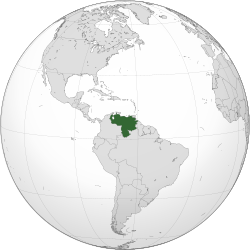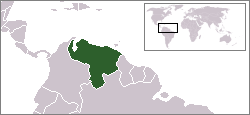Bolivarian Republic of Venezuela[1] República Bolivariana de Venezuela (Spanish) | |
|---|---|
| Motto: Ninguno [None] Traditional: Dios y Federación [God and the Federation] | |
| Anthem: Gloria al Bravo Pueblo Template:Es icon Glory to the Brave People | |
 Venezuela | |
| Capital and largest city | Caracas |
| Official languages | Spanish[2] |
| National language | Spanish[2] |
| Ethnic groups |
|
| Demonym(s) | Venezuelan |
| Government | Federal presidential constitutional republic |
• President | Nicolás Maduro Moros |
| Elías Jaua | |
| Independence | |
• from Spain | 5 July 1811 |
• from Gran Colombia | 13 January 1830 |
• Recognized | 30 March 1845 |
• Current constitution | 20 December 1999 |
| Area | |
• Total | 916,445 km2 (353,841 sq mi) (33rd) |
• Water (%) | 0.32[3] |
| Population | |
• 2011 estimate | 27,150.095 (43rd) |
• 2001 census | 23,054,985 |
• Density | 30.2/km2 (78.2/sq mi) (181st) |
| GDP (PPP) | 2010 estimate |
• Total | $346.973 billion[1] |
• Per capita | $11,889[1] |
| GDP (nominal) | 2010 estimate |
• Total | $285.214 billion[1] |
• Per capita | $9,773[1] |
| Gini (2010) | 39[2] medium |
| HDI (2011) | high · 73rd[3] |
| Currency | Bolívar fuerte[4] (VEF) |
| Time zone | UTC– 4:30 (VET) |
| Driving side | right |
| Calling code | +58 |
| ISO 3166 code | VE |
| Internet TLD | .ve |
^ The "Bolivarian Republic of Venezuela" has been the full official title since the adoption of the new Constitution of 1999, when the state was renamed in honor of Simón Bolívar. ^ The Constitution also recognizes all indigenous languages spoken in the country. ^ Area totals include only Venezuelan-administered territory. ^ On 1 January 2008 a new bolivar, the bolívar fuerte (ISO 4217 code VEF), worth 1,000 VEB, was introduced. | |

Venezuela is a country in northern South America. Its official name is República Bolivariana de Venezuela (Bolivarian Republic of Venezuela). The official language is Spanish, and its capital is Caracas. Venezuela produces a large amount of oil every year, and has one of the largest oil supplies in the world.
Ancient Venezuelans came from the east, west, south, and north. Christopher Columbus was the first European to set foot on the land, but there were already natives living there for a long time. The Spaniards first conquered Venezuela. Slaves were imported from Africa.
Venezuela's inhabitants are very racially mixed. This comes from the colonial period. When whites (the British, Spaniards, French, etc.) conquered America's territory, they took their black African slaves to America to work. During Venezuela's colonial time, black people did not have any rights. They just worked for food. The native people were taught Roman Catholicism. For a long time, white creoles, people in Venezuela that were descended from Spaniards but considered Venezuela home, headed society. The Venezuelan people did not like that, and started thinking about independence. On July 24, 1823, Venezuela won its independence, led by Simón Bolívar. The current president is Nicolás Maduro.
Venezuela's economy is based on oil, cotton, cocoa, sugar, coffee, and tobacco.
Some other languages spoken in Venezuela are Carib, Guahibo, Warao, Wayuu, Pemon, and Piaroa. Most people are Roman Catholic at 96%, and a small minority is Protestant at 2%.
i like hippos
Demographics
The population of Venezuela is about 28,946,101 people.[4] The ethnic groups of the population are:
- 75.4%: multiracial (of any kind).
- 16.9%: European.
- 2.8%: African.
- 2.7%: Amerindian.
- 2.2%: Asian.
Gallery
-
Los Próceres, Caracas - Distrito Capital
-
Plaza Francia – Miranda state
-
Coin
-
Humboldt planetary (Caracas)
-
Cattleya mossiae
-
Stamp 1893
-
Puerto Ayacucho – Amazonas state
-
Puerto Nutrias – Barinas state
References
- ↑ 1.0 1.1 1.2 1.3 "Venezuela". International Monetary Fund. Retrieved 10 October 2010.
- ↑ "Gini coefficient for the Bolivarian Republic of Venezuela". Instituto Nacional de Estadística. 2011.
- ↑ "Human Development indicator for the Bolivarian Republic of Venezuela". United Nations. 2011. Retrieved 5 November 2011.
- ↑ http://www.ine.gob.ve/index.php?option=com_content&view=article&id=473:para-el-30102011-28946101-total-preliminar-de-personas-en-venezuela&catid=121:censo-2011
Caribbean Community (CARICOM) | |
|---|---|
| Associate members | |
| Observer countries | |
¹ Member of the community but not the Caribbean (CARICOM) Single Market and Economy. | |









